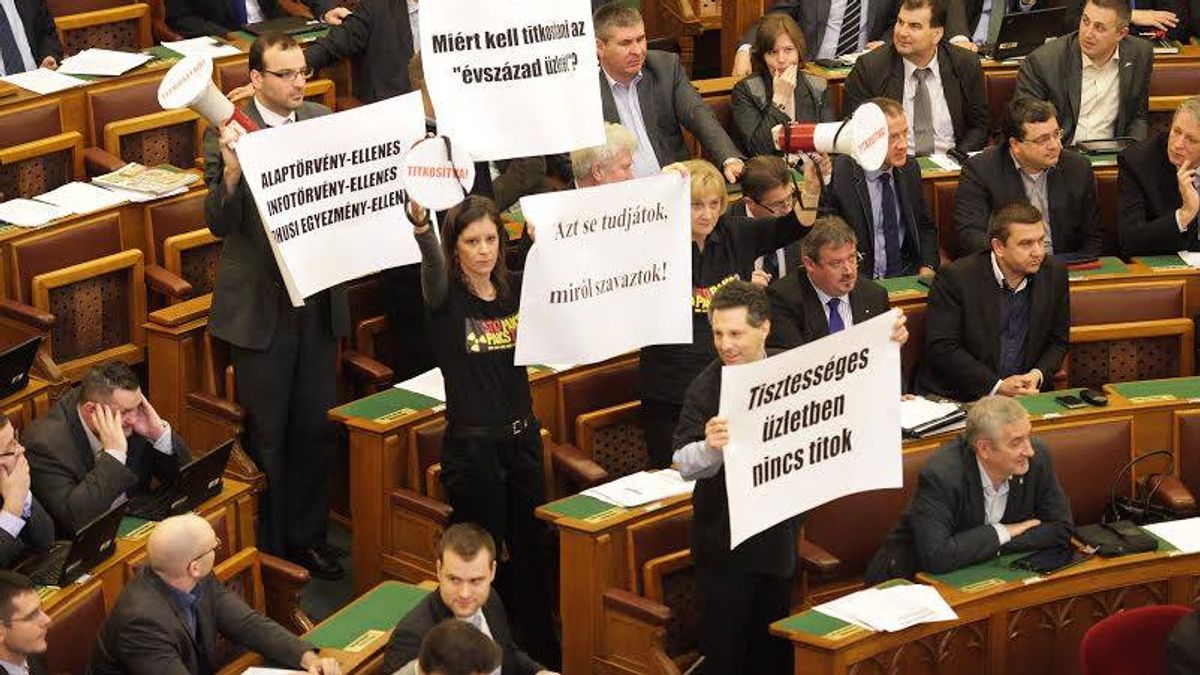Eleve kinek a csövén jönne ide?? Ugye az ukránokén. Tehát megint nem mi döntünk.Mi lesz Mol saját tulajdonú, orosz földön levő kútjaival és azok hozamával? Lehet-e tudni a kitermelési mennyiséget, illetve amennyiben a saját olajunkat hoznánk a csövön annak milyen költségei lennének? Gondolom ez esetben szankció szóba sem jöhetne.
You are using an out of date browser. It may not display this or other websites correctly.
You should upgrade or use an alternative browser.
You should upgrade or use an alternative browser.
Ha az amcsik vennék át akkor inkább ejtsük.Ez a Paksot átveszik az amcsik hir kacsa??

Schiffer András: Jön a hír, hogy az amerikaiak átveszik a Paks2-projektet az oroszoktól
Én annak idején nem az oroszok, hanem Paks bővítése ellen tiltakoztam.mandiner.hu
Mert? Nincs szükségünk áramra??Ha az amcsik vennék át akkor inkább ejtsük.
Nem azt mondom igy legyen, de mi van ha a ruszkikat ellehetetlenítik??
T
Törölt tag
Guest
Ennél többet erről még nem láttam:Ez a Paksot átveszik az amcsik hir kacsa??

Schiffer András: Jön a hír, hogy az amerikaiak átveszik a Paks2-projektet az oroszoktól
Én annak idején nem az oroszok, hanem Paks bővítése ellen tiltakoztam.mandiner.hu

A paksi orosz fűtőanyagról leválásba is besegítene Brüsszel: jönnének az amerikaiak
Nemcsak az orosz olajról és gázról leválást segíti a friss REPowerEU programmal az Európai Bizottság, hanem technikai támogatást ad arra is, hogy a Paksi Atomerőmű is be tudjon szerezni az oroszok helyett máshonnan is nukleáris fűtőanyagot – derült ki a Financial Times pénteki cikkéből.
K
kamm
Guest
Ez a Paksot átveszik az amcsik hir kacsa??

Schiffer András: Jön a hír, hogy az amerikaiak átveszik a Paks2-projektet az oroszoktól
Én annak idején nem az oroszok, hanem Paks bővítése ellen tiltakoztam.mandiner.hu



Brussels to help EU countries end reliance on Russian nuclear fuel
European Commission will assist in speeding up the process of licensing alternatives
 www.ft.com
www.ft.com
K
kamm
Guest

Brussels to help EU countries end reliance on Russian nuclear fuel
European Commission will assist in speeding up the process of licensing alternatives
 www.ft.com
www.ft.com
Brussels to help EU countries end reliance on Russian nuclear fuel
European Commission will assist in speeding up the process of licensing alternatives
The Paks nuclear power plant in Hungary. The facility says it has enough fuel for the long term, but is also working to diversify fuel procurement © Akos Stiller/Bloomberg
Andy Bounds in Brussels and Marton Dunai in Budapest
Brussels is to help EU countries end their dependency on Russian nuclear fuel as it seeks to cut the bloc’s ties to Russian energy by 2027.
The European Commission said it would assist the five EU states that use Russian-designed reactors to speed up the process of licensing alternative fuel.
The Czech Republic, Hungary, Slovakia, Bulgaria and Finland need Russian atomic fuel for reactors built to Russian design and in some cases the Russian company Rosatom is the only licensed provider. Russian aircraft supplying the fuel are currently exempt from EU sanctions against Moscow.
National regulators in each country approve nuclear fuel and the commission will help with technical support, along with international energy agencies.
The announcement was contained in the RepowerEU plan, a road map released this week, outlining how the EU can wean itself off Russian oil and gas by 2027. It comes as US company Westinghouse, confirmed it was seeking quick approval from national governments for a replacement fuel that would work in Soviet-designed reactors in the former Communist countries and Finland.
There are two models, the older VVER440 reactors and the newer and more powerful VVER1000.
Westinghouse said it was seeking approval from the countries’ regulators to use a fuel that it had supplied in the past to the VVER 440s.
“We previously supplied VVER 440 fuel to Finland until 2008 and this was certified in other European countries. We are on a fast-track programme to certify our VVER 440 [fuel] design in all the countries where those reactors are operated in order to be in a position to supply reloads in 2023,” the company told the Financial Times.
Westinghouse’s VVER1000 fuel is already being used in Ukraine and it is seeking approval to supply the Czech Republic and Bulgaria too.
EU officials expect the green light by 2024 at the latest.
Bulgaria, which has around two and half year’s worth of fuel left for its two nuclear reactors, confirmed it was in talks with Westinghouse and was working to certify its fuel quickly.
EU countries including Germany and Poland are pushing for a nuclear ban in the next package of sanctions on Russia in response to its invasion of Ukraine. But the sixth package has been held up by Hungary, which says it needs more time to find alternative energy sources.
An EU diplomat said it should include a ban on Russian companies building new power stations and on research collaborations. “We should end nuclear co-operation with Russia as soon as possible. We don’t want to help them develop their nuclear industry.”
However, a Finnish official cautioned that there were still some unresolved questions. Westinghouse fuel is likely to be more expensive than Russian and there would also need to be a waste plan, as Rosatom is also responsible for handling spent fuel.
Slovakia has said it would switch once an alternative was available. It has around two years’ worth of fuel stockpiled after taking delivery of the exempted Russian fuel after the EU banned Russian airlines from its airspace.
Karol Galek, state secretary at Slovakia’s economy ministry, told the FT the country wanted to switch to alternative fuel for its VVER440 reactors as soon as possible. “We are already in discussion with other companies,” he said. But Bratislava could not support a ban until there is a certified alternative. “We will see what happens with discussions.”
Fortum, which operates the Loviisa power plant in Finland, said it had a fuel deal with Rosatom’s TVEL subsidiary until the current operating licenses expire in 2027 and 2030. The Finnish company applied to the government to extend the plant’s life until 2050.
A spokesman for the Paks nuclear plant in central Hungary said its fuel supply was ensured. “We still have enough fuel for the long term, which we procured from TVEL. Of course, in line with the current situation, we are working with similar nuclear power plants to diversify fuel procurement.”
Additional reporting by Richard Milne in Oslo
Tehát eu tagként nem várhatnánk el, hogy az eu a befektetések szentségét megvédve rávegye az ukr-kat a szállításra? Itt már nem orosz olajról beszélünk, hanem tagállami tulajdonról.Nem ingyen természetesen.Eleve kinek a csövén jönne ide?? Ugye az ukránokén. Tehát megint nem mi döntünk.
Meg kell oldani az amcsik nélkül. Pont mint az orosz olajat. Vegyük már végre komolyan, az usa-nak nincs semmi keresnivalója Európában.Mert? Nincs szükségünk áramra??
Nem azt mondom igy legyen, de mi van ha a ruszkikat ellehetetlenítik??
K
kamm
Guest
Ha az amcsik vennék át akkor inkább ejtsük.
Meg kell oldani az amcsik nélkül. Pont mint az orosz olajat. Vegyük már végre komolyan, az usa-nak nincs semmi keresnivalója Európában.

Pedig arról van szó.Ne viccelj már. Nem arról van szó, hogy a Mol orosz olajat termel ki, hanem a saját, tehát magyar tulajdonú (orosz földön levő) olajról beszélünk. Azt akarod mondani, hogy a tulajdonhoz való hozzáférés jogát földrajzi alapon korlátozná az eu? Szembemenne az eddigi, befektetésekkel, áruk szabad mozgásával kapcsolatos ősi mantrával.
A szankció minden orosz exportra vonatkozik, teljesen indifferens az adott cég tulajdonosi összetétele, vagy hogy hova van bejegyezve. Orosz Föderáció nem az EU tagja, semmilyen szabad mozgással kapcsolatos mantra nincs (és nem is volt) velük kapcsolatban.
Az egy másik impérium.
Lehet egy kérésem? Ha le akarsz hülyézni, tedd nyugodtan. De írd le légyszíves, tudod én nem gerjedek a kunta-kintékre mint te. Meg tudod ezt a szart már elég sokszor elsütötted.
Ezt nagyon nem tudom elképzelni. Tegyük fel van egy multicég, amely megvett egy földdarabot Oroszországban, ahol ritkafémeket bányászik. Természetesen szorgalmasan hordja haza, és vagy felhasználja vagy pedig értékesíti a piacon. Ez nem orosz árú.Szerinted tehát nem így van?Pedig arról van szó.
A szankció minden orosz exportra vonatkozik, teljesen indifferens az adott cég tulajdonosi összetétele, vagy hogy hova van bejegyezve. Orosz Föderáció nem az EU tagja, semmilyen szabad mozgással kapcsolatos mantra nincs (és nem is volt) velük kapcsolatban.
Az egy másik impérium.
Ha még az OF területén van, akkor nem tudja hazahordani, fizikailag. Mert a behozatal meg van tiltva. Ezen most mit nem értesz?Ezt nagyon nem tudom elképzelni. Tegyük fel van egy multicég, amely megvett egy földdarabot Oroszországban, ahol ritkafémeket bányászik. Természetesen szorgalmasan hordja haza, és vagy felhasználja vagy pedig értékesíti a piacon. Ez nem orosz árú.Szerinted tehát nem így van?
Ha az lenne a felállás, amit most megálmodtál, akkor bármelyik orosz cég offshore gründol egy - tegyük fel ciprusi - céget és vígan folytatja a tevékenységét mintha mi se’ történt volna.
Olyan van, hogy egy nem szankcionáló ország (cége) megvásárolja, hazaviszi, átcímkézi és eladja nekünk, mint a sajátját. De ez egy másik kávéház.
Vagy egyesiteni kell a 2 céget, amit már régóta terveznek. Már most jobb helyzet lett volna, ha 1 cég. Persze ma már elég nagy hendikeppel indulunk. Ahogy telik az idő, ez romlani fog...
Akkor jönne a trösztellenes "darabolósdi". Pont a PKN Orlen futott bele abba az EU pofonba, hogy Lengyelországon belül vásárolt fel olajipari céget, aztán EU határozat alapján komplett ágazatokat vitt a szaúdi, olasz meg egyebek. Ugye itt mi a benzinkút hálózattal kapcsolatosan voltunk érintettek és velünk éppen megúszták némi csere-berével (lengyel kutakért adtunk magyar és szlovákot). Úgyhogy velünk pont megúszták - jó fejek voltunk, de 3 másik üzletágat egyszerűen lecsatoltak róluk azt szevasz ...
K
kamm
Guest
Lehet egy kérésem? Ha le akarsz hülyézni, tedd nyugodtan. De írd le légyszíves, tudod én nem gerjedek a kunta-kintékre mint te.





K
kamm
Guest
Ezt nagyon nem tudom elképzelni. Tegyük fel van egy multicég, amely megvett egy földdarabot Oroszországban, ahol ritkafémeket bányászik. Természetesen szorgalmasan hordja haza, és vagy felhasználja vagy pedig értékesíti a piacon. Ez nem orosz árú.Szerinted tehát nem így van?

Ok elengedtem.Ha még az OF területén van, akkor nem tudja hazahordani, fizikailag. Mert a behozatal meg van tiltva. Ezen most mit nem értesz?
Ha az lenne a felállás, amit most megálmodtál, akkor bármelyik orosz cég offshore gründol egy - tegyük fel ciprusi - céget és vígan folytatja a tevékenységét mintha mi se’ történt volna.
Olyan van, hogy egy nem szankcionáló ország (cége) megvásárolja, hazaviszi, átcímkézi és eladja nekünk, mint a sajátját. De ez egy másik kávéház.
Oroszország jelenlegi helyzete nem azt jelenti, hogy "véglegesen" megszakad a kapcsolat. Oroszország hatalmas felvevőpiac, sok területen elmaradt iparágakkal. (itt történelmi felelősége van Putyinnak, aki a nyersanyageladásból beömlő pénzeket nem feldolgozó iparágakba fektette. De ez az Ő problémájuk. Eurázsia nem véletlenül egy földrész. Oroszország nyersanyagkészlet, foszilis anyagai és a nyugat európai, európai gépipar, feldolgozóipar stb. történelmileg és geopolitikailag együttműködést követel. Ez az Egyesült Államok számára az ördög szövetsége, minden lépésükkel már évtizedek óta megpróbálják akadályozni (látjuk sikerrel). Ugyanakkor az biztos, hogy rövidtávon - néhány éve, talán egy évtized - inkább Putyin távozásáig, és egy eurokonform kormányzat regnálásáig ez nem fog működni. Nem szabad ezért csak amerikai és közel-keleti más forrásokra támaszkodni. Rövid távon viszont át kell vészelni ez a helyzetet.
Csak az a veszély, hogy újra és ujra6be fogunk lépni ebbe a csapdába. Megszakad az együttműködés, beindul, megszakad, beindul. És az árát mi fizetjük neg....Oroszország jelenlegi helyzete nem azt jelenti, hogy "véglegesen" megszakad a kapcsolat. Oroszország hatalmas felvevőpiac, sok területen elmaradt iparágakkal. (itt történelmi felelősége van Putyinnak, aki a nyersanyageladásból beömlő pénzeket nem feldolgozó iparágakba fektette. De ez az Ő problémájuk. Eurázsia nem véletlenül egy földrész. Oroszország nyersanyagkészlet, foszilis anyagai és a nyugat európai, európai gépipar, feldolgozóipar stb. történelmileg és geopolitikailag együttműködést követel. Ez az Egyesült Államok számára az ördög szövetsége, minden lépésükkel már évtizedek óta megpróbálják akadályozni (látjuk sikerrel). Ugyanakkor az biztos, hogy rövidtávon - néhány éve, talán egy évtized - inkább Putyin távozásáig, és egy eurokonform kormányzat regnálásáig ez nem fog működni. Nem szabad ezért csak amerikai és közel-keleti más forrásokra támaszkodni. Rövid távon viszont át kell vészelni ez a helyzetet.
